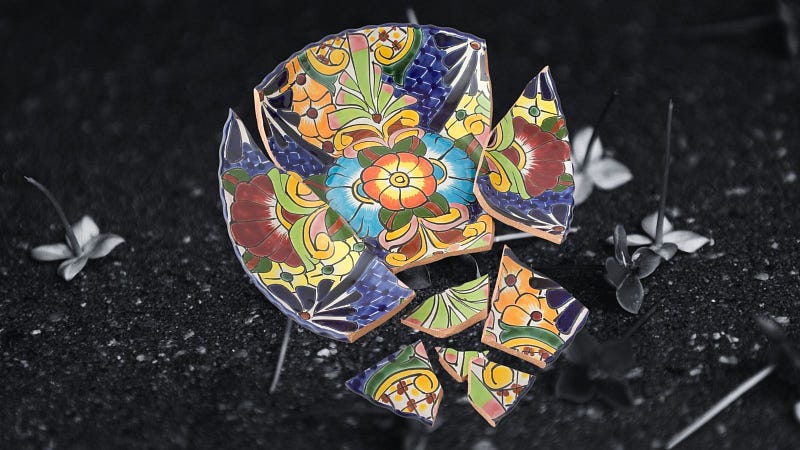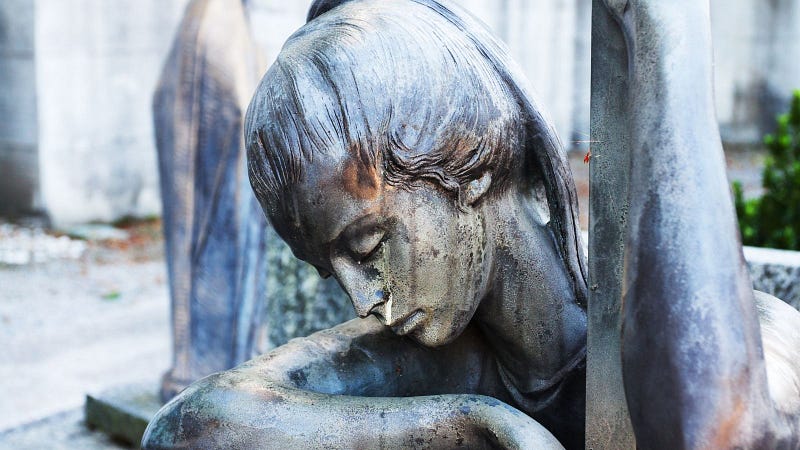We Don’t Have Time for Grief
A broken culture, but through the cracks, a light shines.

The first close person in my life to die will not do so because of Covid-19. He’s had cancer for several years, and, because he’s Native American and poor, his access to good care has been sporadic at best. When I received word that he was in the ICU for a stroke, only the stroke itself came as a surprise.
And yet, no matter how often we experience the death of someone close to us, the experience never ceases to be a sharp one. Indeed, something like the death of a loved one causes other effects. We remember other loved ones who have flown, we think about the deaths to come, whether our own or those of the people we love who will one day leave. This sort of pain requires time, and space, and a great deal of compassion.
The problem is that time for grief is not something we are allowed.
In the world today, grief is the luxury of the wealthy and the powerful; to experience grief, in all its dimensions, requires the ability to leave off responsibilities. It requires that we dedicate time to the experience of grief, time in which we can work through the pain, the anger, and the deeper thoughts that accompany such a loss.
Even a few days can make a world of difference in our ability to cope with colossal pain… but most people don’t actually have the time and space in which to do that. Most people cannot take time off of work, or, if they do, it is a sacrifice that adds untenable stress to other areas of their life.
Most people, especially these days, lead what I consider to be a broken life: because a life devoid of time for grief is a life beset by incalculable cruelty.
Sometimes, when we look at the world, and we try to understand what is wrong, we need to look at the most basic obvious structural needs: food, shelter. While our society isn’t doing very good in those areas for a huge portion of its populace, access to amenities does exist for many.
What doesn’t exist is time. Time to mourn missed opportunities, a broken relationship, a financial setback, or the loss of someone we love. In our culture’s hierarchy of needs, community and fulfillment are sorely lacking; a society-wide sense of compassion and a willingness to witness and sit with grief is missing. And that is, I think, quite terrifying.

Recently, I talked with a friend about the aspect of Jewish tradition called “sitting shiva” a period of seven days spent mourning after a loved one’s burial. It’s an important part of Jewish culture, and it speaks to an innate understanding that this time is vital to the wellbeing of the community left behind by the person who has died. My friend and I lamented that this practice did not exist in the wider society. While the United States makes space for many cultures and religions to practice on their own terms, the overarching culture is one of workaholic capitalism. We’ve both experienced deaths in our close family units, and we’ve both felt the tension placed on us by our lives and responsibilities — and the lack of social support offered by society to help us cope with trauma.
So, our culture is broken because any culture that does not create space for grief is broken. Space for grief cannot be bought; it cannot be a sacrifice. We cannot grieve properly if we know that our grief will be purchased at the cost of our later wellbeing, or the wellbeing of our family. And, for many, the process of grief will take even more time because there is no innate training in our society for how to sit with grief. If we don’t know how to be present with the grief we feel, we are going to have to learn as we go, and our society certainly doesn’t make any allowances for that.
However, all is not lost. While broken, I believe that the cracks in our society offer us the chance to peer through the surface of our lives. Beneath the surface of things that we accept as normal is a dangerous mess, and by peering through the cracks we can maybe take stock of the real damage at our culture’s heart. Something cannot be fixed until it is known, until it is seen.
Covid-19 has caused a lot of damage to our society, and more climate-induced catastrophes await us in the future. But we don’t have to sit idly and wait to meet them: if we are intentional about how we build our world, we might be able to change things for the better. We might, in time, create the kind of society that allows us time to grieve.
